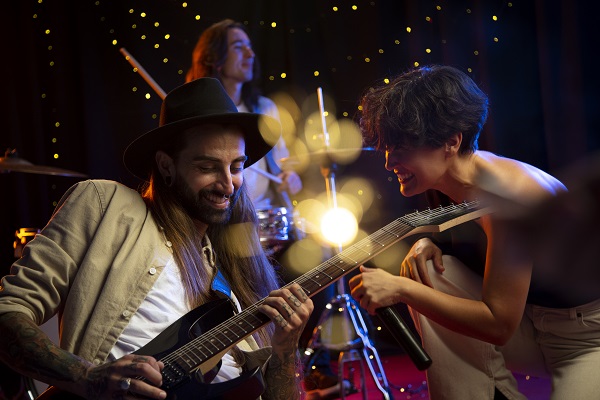Music: Beijing Scene

Step into the bustling streets of Beijing, where the enchanting melodies of the city's music scene beckon you to explore its hidden treasures.
Like a symphony of cultural nuances and artistic expressions, Beijing's music scene resonates with the echoes of a rich history and a vibrant present.
From the birth of Chinese rock music to the rise of iconic musicians, the capital city of China has played a pivotal role in shaping the country's popular music landscape.
But there is more to this musical journey than meets the eye.
So, get ready to immerse yourself in the pulsating beats, the intimate clubs, and the electrifying festivals that make Beijing a haven for music enthusiasts.
Key Takeaways
-
Beijing has been a center for Chinese language popular music, particularly in the rock genre, since the late 1980s.
-
The revival of popular music in Beijing in the 1980s was marked by the success of songs like 'Let the World be Full of Love' and 'Nothing to My Name'.
-
Censorship of popular music became a challenge for artists like Cui Jian in the 1990s.
-
Beijing offers a diverse range of venues for concerts, including state-owned venues and smaller live music venues, catering to different music genres and audience preferences.
Beijing's Role in Chinese Popular Music
Beijing, with its vibrant music scene and historical significance, plays a pivotal role in shaping the landscape of Chinese popular music. One notable aspect of Beijing's music scene is the influence of Taiwanese musicians on the city's pop music industry. In the 1980s, as popular music returned to the People's Republic of China, Taiwanese musicians and companies played a significant role in professionalizing the industry in mainland China. This collaboration brought new styles and influences to Beijing's music scene, enriching the diversity and creativity of the local music industry.
Another significant development in Beijing's music scene occurred during the Cultural Revolution. Traditional Chinese melodies were incorporated with Western orchestration, creating a unique fusion of sounds. Films like 'Taking Tiger Mountain by Strategy' and 'The Red Detachment of Women' showcased this fusion, captivating audiences with a blend of traditional and contemporary elements.
These influences and innovations have contributed to the emergence of pop stars in genres such as official pop, rock, and urban folk. Beijing's music venues, from prestigious locations like the Workers Stadium and the National Center for Performing Arts to smaller live music venues like D.Live and Mao Livehouse, provide platforms for artists to showcase their talent and connect with audiences.
Beijing's music scene continues to thrive and evolve, attracting both established and emerging artists. Its rich history and vibrant atmosphere make it a hub for creativity and cultural diversity, ensuring that the city remains at the forefront of Chinese popular music.
Rebirth of Popular Music in the 1980s
As the vibrant music scene in Beijing continued to flourish, a significant turning point emerged in the 1980s with the rebirth of popular music, marking a new era of creativity and cultural transformation. This resurgence of popular music had a profound influence on Chinese culture and had a lasting impact on censorship.
The 1980s saw the return of popular music to the People's Republic of China after a period of strict control and promotion of mass music during the Revolutionary Period. The success of songs like 'Let the World be Full of Love' and 'Nothing to My Name' marked the rebirth of popular music in 1986. These songs, with their catchy melodies and heartfelt lyrics, resonated with the Chinese people and became anthems of a new generation.
One of the prominent figures of this era was Cui Jian, a rock musician who emerged during this period. His music, which addressed social and political issues, faced censorship in the 1990s. Despite the challenges, Cui Jian's music inspired a generation and paved the way for the development of rock music in China.
The reintroduction of popular music in the 1980s not only provided a platform for artistic expression but also challenged the existing censorship policies. The lyrics and themes explored in popular music pushed the boundaries of what was acceptable, encouraging a more open and diverse cultural landscape.
The rebirth of popular music in Beijing in the 1980s had a profound influence on Chinese culture, allowing for greater creativity and artistic expression. It also served as a catalyst for change, challenging the censorship policies of the time and paving the way for the development of a more vibrant and diverse music scene in China.
Concert Venues in Beijing
When it comes to experiencing live music in Beijing, you'll find a diverse array of concert venues that cater to every musical taste and provide unforgettable experiences.
However, it's important to note that there are certain concert venue restrictions in Beijing. State-owned venues typically require audiences to remain seated during concerts. This can sometimes limit the energy and excitement of the performances.
But fear not, because in recent years there's been a rise of independent music venues in Beijing. These venues offer a more intimate and vibrant atmosphere, allowing audiences to fully immerse themselves in the music.
Some popular independent venues include D.Live, Tango, Yugong Yishan, Mao Livehouse, PostMountain, Dusk Dawn Club, Temple, as well as smaller venues like What Bar, Hot Cat, School Bar, and Caravan.
These venues not only showcase local talent but also attract international artists, contributing to the cultural diversity of the city's music scene.
Clubs in Beijing
Discover the vibrant nightlife of Beijing as you delve into the exciting world of clubs in the city. When it comes to clubbing, the Sanlitun district is the place to be. Known for its lively atmosphere and diverse music scene, Sanlitun offers a range of clubs that cater to different tastes. Whether you're into techno, dance, or alternative music, you'll find a club that suits your style.
One standout venue in the Sanlitun club scene is Lantern. It's the go-to place for techno enthusiasts and those looking for less mainstream dance music. With its underground vibes and cutting-edge DJ sets, Lantern provides a unique experience for clubbers in Beijing.
If you're looking for a club with a wider range of music options, Dada is the place to go. Located near Temple and Mao Livehouse, Dada offers a diverse lineup of music genres, ensuring that there's something for everyone. From electronic beats to indie hits, you'll find it all at Dada.
For those who prefer the underground music scene, Modernsky lab is a must-visit. This venue specializes in arranging DJ nights and showcases some of the best talent in the underground music segment.
In addition to these venues, there are also clubs like Propaganda and Solutions in Wudaokou that cater to the student crowd, providing a lively and energetic atmosphere.
With its thriving club scene and diverse range of venues, Beijing offers a nightlife experience that's truly unparalleled. So put on your dancing shoes and get ready to explore the exciting world of clubs in the city.
Festivals in Beijing
Immerse yourself in the vibrant music scene of Beijing as you venture into the realm of festivals that showcase a diverse range of genres and provide a platform for both local and international artists. Beijing's festivals have been greatly influenced by Taiwanese musicians, who played a pivotal role in professionalizing the pop music industry in mainland China. These festivals offer unique outdoor experiences that add to the excitement of the music scene in Beijing.
One of the most prominent festivals in Beijing is the Midi Festival, which has been held annually since 2000. This festival features a wide variety of music genres and attracts both local and international artists. It serves as a platform for emerging musicians to showcase their talent and gain recognition.
Another popular festival is the Strawberry Festival, which focuses on rock and indie music. It draws large crowds and promotes the local music scene. The Modern Sky Festival is another must-attend event in Beijing, showcasing a mix of genres and contributing to the cultural diversity of the city.
For a more unique experience, the Zhangbei Festival is located northeast of Beijing on the prairie. It offers a four-hour drive from the city and features a variety of music styles. This outdoor festival provides a refreshing change of scenery and allows attendees to enjoy music in a natural environment.
Beijing's festivals, such as Fete de la Musique, Sound of the Xity, Jue, and China Drifting, held in live houses, provide platforms for local and international artists and showcase different music genres. These festivals contribute to the vibrant music scene in Beijing and make it a destination for music lovers from all over the world.
Conclusion
As you bid farewell to the vibrant music scene of Beijing, you leave with a newfound appreciation for the city's rich musical heritage. From its role in the birth of Chinese rock music to its diverse concert venues, clubs, and festivals, Beijing has established itself as a haven for music enthusiasts.
Whether you're a fan of pop, rock, folk, or classical music, this bustling capital city offers an immersive and dynamic experience that will leave you craving more. Don't miss the opportunity to explore Beijing's incredible music scene and create unforgettable memories.













